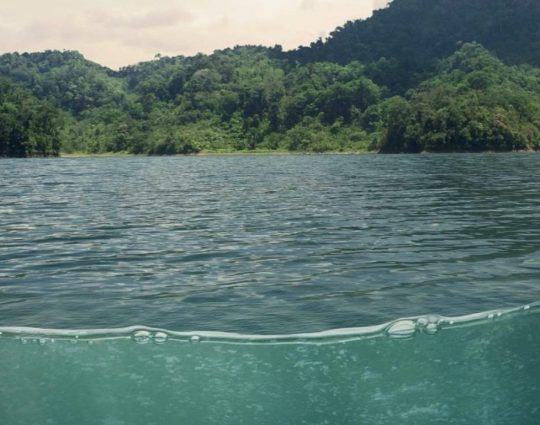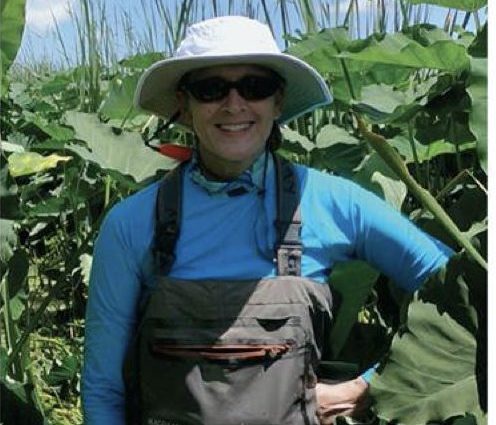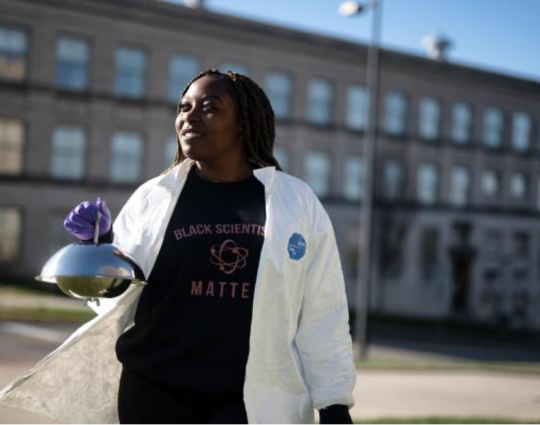
Parsons Laboratory Seminar Series: Molecular-level reactivity of dissolved organic matter in natural and engineered systems
Please join us for the Ralph M. Parsons Laboratory Seminar Series with speaker Christy Remucal, of University of Wisconsin, who will discuss "Molecular-level reactivity of dissolved organic matter in natural and engineered systems" Faculty host: Prof. Plata
The seminar is in-person at 15 Vassar Street, 48-316 and requires registration.
For more information or how to attend this seminar virtually, please contact lumidi@mit.edu

CEE Faculty Seminar Seminar Series: Vegetation Hydrodynamics for Restoration, Climate Mitigation and Adaption
Please join us for the CEE Faculty Seminar Series with speaker Prof. Heidi Nepf, who will discuss "Vegetation Hydrodynamics for Restoration, Climate Mitigation and Adaption" Faculty host: Prof. Carstensen
The seminar will be held in-person at 1-131. For more information or how to attend this seminar virtually, please contact Jeanette at jmmarch@mit.edu

Parsons Laboratory Seminar Series: Ecology in an Autocorrelated World
Please join us for the Ralph M. Parsons Laboratory Seminar Series with speaker Sebastian Schreiber of University of California, Davis, who will discuss "Ecology in an autocorrelated world." Faculty host: Prof. Saavedra
The seminar is in-person at 15 Vassar Street, 48-316 and requires registration.
For more information or how to attend this seminar virtually, please contact lumidi@mit.edu

Parsons Laboratory Seminar Series: Wild Microbial Ecology
Please join us for the Ralph M. Parsons Laboratory Seminar Series with speaker Bruce Hungate of Northern Arizona University who will discuss “Wild Microbial Ecology”. Faculty host: Cesar Terrer
The seminar is in-person at 15 Vassar Street, 48-316 and requires registration.
For more information or how to attend this seminar virtually, please contact lumidi@mit.edu

Future Leaders in CEE: Emission Characterization and Criteria for Remediation of Polychlorinated Biphenyls in Lower-Income Public Schools
Join the MIT Civil and Environmental Department for its Future Leaders in CEE: Supporting research, career development, diversity, equity and inclusion seminar series that brings together speakers from diverse backgrounds who are considered future leaders in STEM and civil and environmental engineering to share their journey to achieve success. This month's speaker is PhD candidate in Civil and Environmental Engineering at the University of Iowa, Moala Keshei Bannavti Seminar topic: Emission Characterization and Criteria for Remediation of Polychlorinated Biphenyls in Lower-Income Public Schools In a school, airborne polychlorinated biphenyl (PCBs) exposure may come from multiple sources. We hypothesized that there are both Aroclor (historic) and non-Aroclor (modern) sources within a single school and that PCB concentration and congener profiles differ among rooms within a single building. To evaluate this hypothesis and to identify potential localized sources, we measured airborne PCBs in nine schoolrooms. School room concentrations and congener profiles statistically varied from one room to another. Rooms in the oldest wing of the building, constructed between 1920 and 1970, had the highest PCB concentrations. The congener distributions indicate historic use of Aroclor 1254 as well as modern sources of non-Aroclor congeners associated with paint pigments and surface coatings. Our findings suggest this noninvasive source identification method presents an opportunity for targeted source testing for more cost-effective prioritization of materials remediation in schools, making PCB remediation more accessible for disadvantaged school districts. About the Presenter: Moala is a PhD candidate in Civil and Environmental Engineering at the University of Iowa, studying room-to-room variation and remediation of polychlorinated biphenyls in minority-predominant, low-income public schools. As a first generation Cameroonian immigrant raised in urban NJ, Moala identifies first-hand with the issues in minority predominant low-income school districts and is determined to bridge the gap in environmental justice experienced by those of low socioeconomic status. Please email Stephanie at smartino@mit.edu if you would like to attend.
Discover Course 1 FROP
Participate in Discover Course 1 and make your first week at MIT one that will make an impact on the world and on your MIT experience. Organized around dynamic, hands-on modules and small team competitions, you will learn about the diversity of study in the Department of Civil and Environmental Engineering and meet faculty and current students, as well as discover exciting opportunities engineers have at MIT – especially in Course 1!
Future Leaders in CEE: Self-Healing Materials: Toward Smart and Adaptive Materials for the Environment
Unlike biological systems, most materials we use every day cannot recover from physical or chemical damage on their own. Self-healing materials are a class of materials that can do just this, but their development and application has mostly been limited to inert and moisture-free systems. This presentation will discuss the design of selfhealing materials for environmental applications using water filtration membranes as an example. Two different approaches to self-healing will be discussed. One approach is to embed microscopic capsules or capillary tubes within a material. These containers serve like a network of blood vessels that can deliver various healing agents. When a material is damaged, a “healant” that is loaded within this network flows out and reacts with the outside environment to solidify in place and seal the damage. The second approach relies on the capacity of polymeric chains or other molecules to diffuse, reorganize, and re-form bonds with one another. If at least part of the underlying covalent or secondary bonds that hold the material together can re-form easily after breaking, this will allow the material to recover from damage. In both of these approaches, factors to take into account when designing self-healing materials for other environmentally oriented applications in general will also be discussed. Finally, I will discuss my academic journey and share my experience navigating the start of a tenure-track faculty position. Dr. Getachew is an Assistant Professor in Environmental Engineering at Rice University. She completed her Ph.D. and M.Sc. in Chemical and Environmental Engineering at Yale University, where she developed the first autonomously self-healing water filtration membranes. She also holds a B.S. in Chemical Engineering (ABET) from Yale. Prior to joining Rice University, Dr. Getachew spent two years as a Postdoctoral Associate at the Department of Materials Science and Engineering at Massachusetts Institute of Technology. Her current research focuses on understanding the performance of “smart materials” in the context of water treatment technologies and resilient water infrastructure.
CEE Faculty Seminar Series
Please join us for the CEE Faculty Seminar Series with Speaker Prof. Charles Harvey May 11 at 12 p.m. ET For more information or how to attend this virtual event, please contact jmmarch@mit.edu
Pierce Laboratory Seminar Series
Please join us for the Henry L. Pierce Laboratory Seminar Series with MIT CEE alumni, Speaker Domniki Asimaki (CalTech) who will discuss his research, “On the Complexity of Seismic Waves Trapped in Shallow Geologic Features”
Future Leaders in CEE: Diversity, Equity and Inclusion Research Talk and Lunch Series
CEE holds a regular seminar series to foster diversity, equity and inclusion. Speakers from diverse backgrounds who are considered future leaders in STEM and the domain of civil and environmental engineering will share their journey to achieve success in STEM and their research. The goal of this initiative is to start a dialogue around the topics of diversity, equity and inclusion, address the relative lack of representation of certain groups and present examples of those who were able to overcome unique challenges. Speakers will present a two-part seminar: one part of the seminar will be an overview of their research and the other will focus on how they have navigated through various challenges associated with diversity, equity and inclusion in STEM. Seminar topic: Can a deeper understanding of diversity improve engineering? Expanding engineering education through developing Contextual Social Awareness Speaker information: Greses Pérez is an Afro-Latina engineer, learning scientist and educator. She is a Ph.D. candidate at Stanford University in Science Education and Learning Sciences. Her research focuses on the role of language and cognition in engineering and science learning, particularly for Black and Brown students. In addition to her ongoing work on culturally relevant VR education, Greses combines interdisciplinary perspectives and mixed methodologies to investigate issues of diversity and inclusion in engineering. Before coming to Stanford, she was a bilingual educator at low-income elementary schools in Texas. Prior to starting her career in education, Greses was an engineer project manager in the Caribbean. She holds a B.S. in Civil Engineering from Santo Domingo Technological Institute, a M.Eng. in Civil Engineering from the University of Puerto Rico at Mayagüez, and a M.Ed. in School Leadership from Southern Methodist University. Her work seeks to improve education for students who experience a cultural mismatch between the ways of knowing and speaking in their communities and those in STEM.

